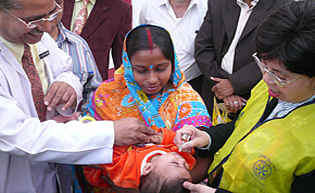Elimination of Rubella, Measles possible by 2020: WHO
November 14, 2014 | Friday | News | By BioSpectrum Bureau
Elimination of Rubella, Measles possible by 2020: WHO
WHO's Mission 2020: Lessons from polio eradication are being used to seek and reach out to the most vulnerable populations with measles and rubella vaccines
"WHO's Southeast Asia region is committed to the elimination of measles and control of rubella/congenital rubella syndrome by 2020. Countries are scaling up efforts to protect children against these deadly diseases by targeting 95 percent coverage with each of the two doses of measles vaccines and rubella containing vaccine to the childhood immunization schedule," mentioned Dr Poonam Khetrapal Singh, WHO Regional Director for Southeast Asia Region on the release of the report on measles on November, 14.
WHO is supporting the member states to develop robust national plans for measles elimination and rubella control. Efforts are focused on building a sensitive and timely standardized laboratory supported case-based surveillance for measles and rubella for which laboratory networks are being expanded and their capacities enhanced. The Region has a mix of success stories and challenges.
Dr Khetarpal stated further,"Four of the eleven countries - Bhutan, Democratic People's Republic of Korea, Maldives, and Sri Lanka - are likely to have eliminated measles, which will need to be verified. At the same time, the Region still accounts for nearly one-third of the children who have no protection against measles. While the progress gives us confidence, the challenges are a reminder that we need to do more. The disease is highly contagious and can cause serious complications including blindness, encephalitis, severe diarrhoea, ear infection, and pneumonia, particularly in malnourished children and people with reduced immunity. We know measles can be prevented with immunization. We must protect our children with measles and rubella-containing vaccines."










